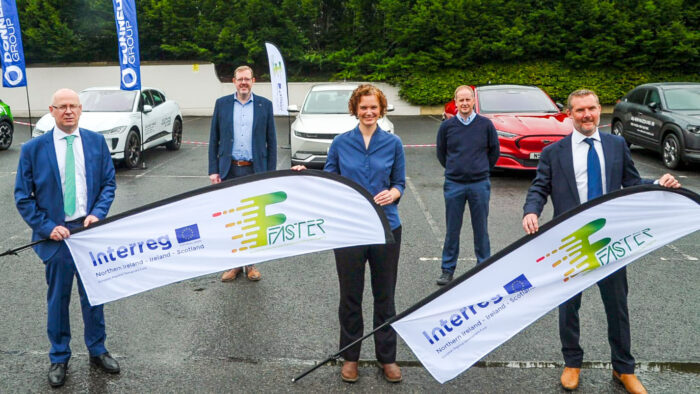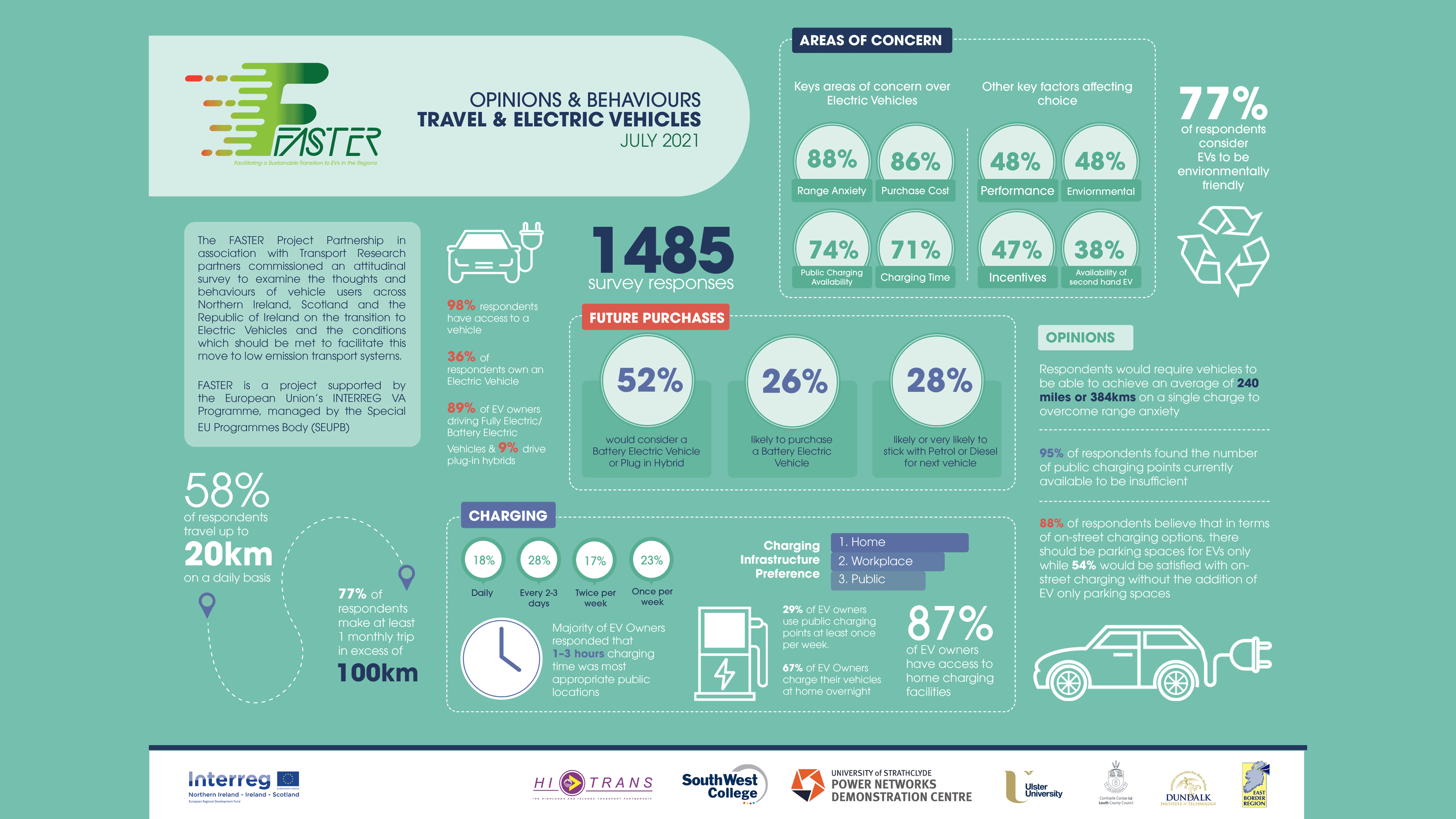It’s World EV day and this morning the East Border Region held the official launch for ‘FASTER’, a €6.4m/£5.8m Special EU Programmes Body (SEUPB) project that will provide 73 new Rapid chargers, split between Northern Ireland, Republic of Ireland and Scotland.
We are looking forward to the completion of this scheme which will significantly increase the number of Rapid Chargers in Northern Ireland. It is certainly the most notable project since the roll out of the network began here in 2011.

More Than Double
The Department for Transport publishes quarterly figures for EV chargers using Zap-Map data. The latest update (July 2021) shows that there are 21 Rapid Chargers in Northern Ireland (17 x ESB, 1 x IKEA Ecotricity, plus some car dealerships etc). With a population of 1.89 million, that means that we currently have…
1.1 Rapids per 100K population
So how will things look after the FASTER Project delivers these new chargers? Assuming there will be 24 new DC units, this will see Northern Ireland reach a total of 45 Rapids, which is…
2.4 Rapids per 100K population
So then, the project will more than double DC availability here.
Still Bottom
The average for GB currently sits at 6.9 Rapids per 100K population, so we will still only have one third of that level, once the FASTER project is finished. Scotland currently has 12.0, so we will have one fifth of their rapid sites and still be bottom of the charging league in the UK. And of course that’s comparing things with today’s figures, the other regions will no doubt have expanded significantly by 2023, the year the FASTER Project will be completed in NI (May 2023).
By way of contrast to the diminutive level of spending on EV Infrastructure here, the video message from Graeme Dey, Scottish Government Minister for Transport told the gathering that…
“The Scottish government have invested over £45M in our electric vehicle charging network.”
We need to see many more ambitious schemes, like the FASTER project, in quick succession so that we can level up in Northern Ireland.
Video & Survey
You can watch the video of the event from the Armagh City Hotel below.
As part of the preparation for the FASTER roll-out, a survey into EV attitudes was launched in the 3 regions. Northern Ireland punched above its weight here, with the highest per capita response rate. Some of the key findings of the survey are below along.
Transport Research Partners in collaboration with the FASTER Project partnership developed a public survey which was disseminated regionally in July 2021. Following an open public call and extensive supporting public relations and social media campaign a total of 1,485 responses were received.
Regional Profile
- Scotland 35%
- Northern Ireland 34%
- ROI 30%
- Other 1%
Gender
- Male 639 (43%)
- Female 428 (29%)
- Other/Did not answer 418 (28%)
Range & Driving
- Average daily trip 13.04 miles – drivers in NI & Scotland travel longer distances compared to respondents in ROI
- Respondents would require a vehicle to achieve an average of 240 miles on a single charge to overcome range anxiety
Respondent Profile
- 65% of respondents were in full time employment prior to the onset of the COVID 19 pandemic
- 99% of respondents have regular access to a car they own, or that is available to them within their household or through other means including leasing schemes and company vehicles
- 427 respondents are existing Electric Vehicle owners (89% of those owning Battery Electric Vehicles and 9% plug in hybrids)
Charging
- 95% of respondents found the number of public charging points to be insufficient
- 87% of electric vehicle owners currently have access to home charging facilities
- 18% of those with home charging facilities charge on a daily basis, 28% every two to three days, 17% charge at home twice per week and 23% at least once per week
- Preferences for charging infrastructure: Home >>> Workplace >>> Public Charge Points
- 29% of EV owners use a public charge point at least once per week
- Majority of EV owners consider 1 – 3 hours the most appropriate charging time on a high street or in a public location
Attitudes
- 52% of all survey respondents willing to consider a Battery Electric Vehicle or Plug in Hybrid for their next vehicle. 26% likely to purchase a BEV
- 77% of respondents consider EVs to be environmentally friendly and 59% believe they provide a healthier option for drivers
- 70% of respondents consider the running costs of an Electric Vehicle to be lower than those of a traditional petrol or diesel engine vehicle
- 1,090 respondents indicated a change in their travel behaviour patterns as a result of COVID, with a 54% increase in numbers of people walking for please/exercise and 13% increase in numbers cycling for the same purposes
Key areas of concern for survey respondents
- Range (88%)
- Purchase Cost (86%)
- Availability of Public Charging Infrastructure (74%)
- Time required to charge (71%)
Key factors affecting motorist choice
- Vehicle Performance (48%)
- Environmental Concern (48%)
- Switching incentives (47%)
- Availability of second hand models (38%)


One response
What’s extra generous about the above is if you count actual usable infrastructure for a car other than the leaf, there are nine CCS rapid chargers. Seven of them might work.